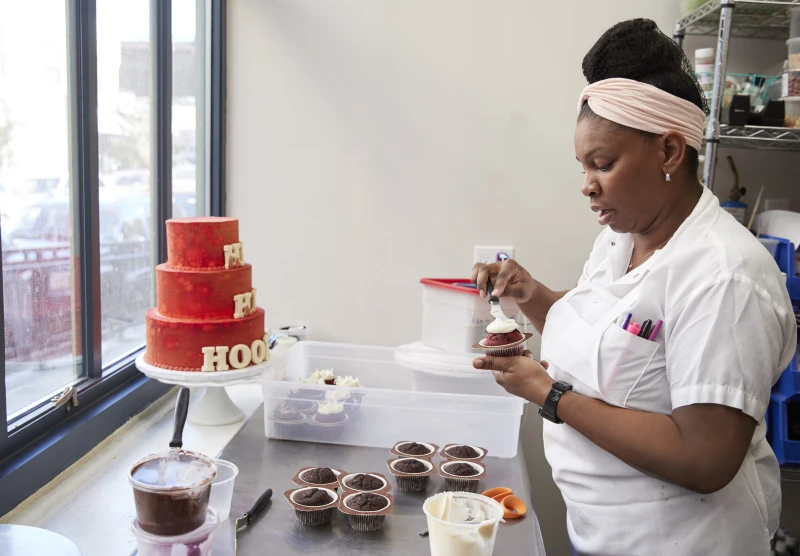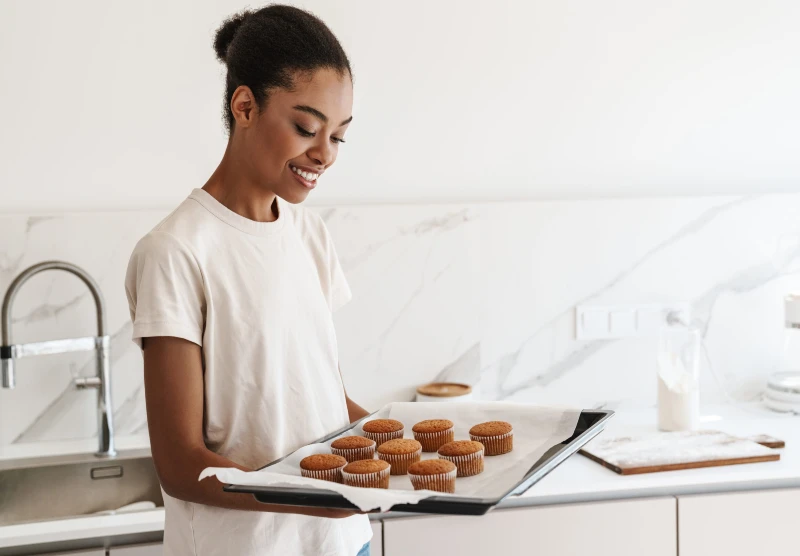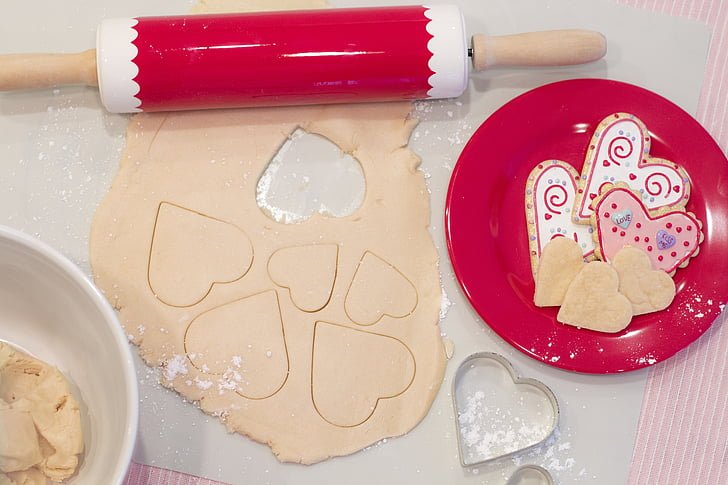
Hollywood agrees: The kitchen is a space for profound connection
by Lexie Grech from www.foodandbeing.com / www.instagram.com/lexiegrech
For most, cooking is merely a task to check off the list, a duty in the daily grind. And although there are days where it feels like that for me and other culinary aficionados, there are those of us who rise and come into our own in the kitchen space.
Since my early days, guided by my grandfather Joe’s love of being in the kitchen, cooking has served as a grounding ritual, fostering a deep introspective reflection and infusing me with an all-encompassing sense of fulfilment.

Intense flavours of reconnection
In 2007, Disney’s Ratatouille graced our screens, and for the first time, I felt truly seen. For those unfamiliar with it, Ratatouille is a heartwarming animated film that follows Remy, a rat with a passion for cooking, who forms an unlikely alliance with Linguini, a garbage boy at the late chef Gusteau’s Parisian restaurant, to pursue his culinary dreams. As I watched Remy chop, mix, smell, and taste with unadulterated joy, I found myself deeply resonating with his connection to cooking. In the kitchen, Remy tapped into his zone of genius, making the impossible seem possible, and for a brief moment, viewers bought into chef Gusteau’s
belief that truly anyone can cook.
Yet, for me, the most underrated yet powerful moment of this movie lies in the scene where Anton Ego is presented with Remy’s humble Ratatouille, a rich, savoury and vibrant French Provençal vegetable stew. The ruthless and sombre food critic is taken aback when presented with this traditional dish at an upper class restaurant, but upon tasting it, he is whisked right back to his childhood kitchen, where his joy and love for good food flourished. That scene always makes me feel like I’m chopping onions. Similarly, in Netflix’s hit series ‘Sex Education’, Michael Groff, Adam’s dad, a serious, straight-thinking headmaster,
loses himself and undergoes a transformative journey, finding solace and rediscovering his true essence as he bakes, what I believe is, his mother’s cherished apple pie. These scenes beautifully illustrate the transformative power of cooking, transcending mere sustenance to evoke cherished memories and reconnect individuals with their authentic selves.
In the kitchen, we not only get the invitation to connect with ourselves, but we are also called to extend that invitation to our loved ones
Planting discomfort as a seed for growth
Connecting to our sense of self-identity in the kitchen doesn’t always have to come from food prepared by loved ones. In the award-winning film ‘Julie and Julia’, we witness Julie, who loses all sense of purpose in an unappealing, soul-crushing job, and decides to seek joy in the recipe book ‘Mastering the Art of French Cooking’ by culinary royalty Julia Child. Determined to cook every recipe within its pages, Julie embarks on a transformative journey that pushes her beyond her comfort zone and forces her to confront her fears and insecurities. Through this process, she rediscovers her true values, passions, and priorities, emerging with a newfound sense of self-awareness and confidence. Julie’s journey illustrates the profound impact that cooking can have on our personal growth and fulfilment, demonstrating that not even the lack of external validation (from Julia Child herself, no less) can dim the joy of self-discovery.
Serving up superpowers
Not only does the kitchen allow us to safely connect with our authentic selves, it also invites us to explore our superpowers and find our own unique way to serve others. Julieta Madrigal’s character in Disney’s ‘Encanto’ embodies this, utilising her gift of cooking to heal people with her delicious food throughout the movie.
This concept is also powerfully brought to life in a scene from the box office hit Barbie, where Barbie meets her maker, Ruth Handler*, in the kitchen. Ruth starts by saying, ‘You’re safe here,’ setting the premise that the kitchen is a safe space. Barbie, in utter wonder, asks, ‘What is this place?’ to which Ruth responds, ‘I always find I do my best thinking at kitchen tables’. I couldn’t agree more. The kitchen gives us the space to stop, think, consider, play and create, whilst connecting to our wise inner voice, fostering inspiration that transcends into various aspects of our daily lives.
Honouring our rooted identity
In the kitchen, we not only get the invitation to connect with ourselves, but we are also called to extend that invitation to our loved ones, including those who have moved on from this life. This concept is beautifully illustrated in the character of Tiana from Disney’s ‘The Princess and the Frog’. Tiana, a strong-willed, vibrant, and determined woman, not only saves the day but also fulfils her dream of running her own restaurant business to honour her father’s legacy. What resonates with me most is how Tiana utilises the kitchen space to reconnect with her father and access the nourishment he provided through his food. This connection fills her cup so fully that she can extend that nourishment to her diners through the most amazing Creole cuisine. As someone who runs a legacy business in honour of my grandad, I deeply empathise with her sense of purpose. In a similar vein, Stanley Tucci’s captivating CNN series ‘Searching for Italy’ provides a mesmerising exploration of how delving into our roots, cultural identity, and connecting with past generations can be a delicious discovery. Through Tucci’s journey, we are invited to unlock deeper insights into the fabric of our
own being, whilst quite literally salivating at the abundance of goodness that he introduces us to in his travels.
A melting pot for rebellious acts of change
It would be impractical to list every culinary moment from the past decade and a half, but one notable mention is Brie Larson’s portrayal of Elizabeth Zott in ‘Lessons in Chemistry’. Unlike my own culinary approach, Zott’s demeanour is scientific, precise, and focused on patterns and repeatability. Yet, she manages to ignite a movement in the kitchen, erasing self-doubt and championing self-assertion in an unprecedented manner. Zott inspires a nation, advocating for purpose and empowering women to find their voices—all possible because it’s delivered from a place they already connect with: the kitchen.
Finally, allow me to fully indulge in the pregnant silences of ‘The Taste of Things’, starring Juliette Binoche, known for her role in ‘Chocolat’, amongst others. I had never been on such a slow-motion roller coaster of intense emotions until I savoured this work of art. Through a series of immaculate kitchen shots, empty of dialogue but bursting with sizzles, plops, pours and slurps, this film makes the ordinary extraordinary. It reminds us that treasured moments are the ones we tend to take for granted. Magic is created every single day in the mundane; when in a world that glorifies busyness, we rebelliously surrender to a slower rhythm to truly be in the moment, sit with the discomfort of silence and not try to needlessly fill it in. Because if only we give into our sensuality in an uninhibited way, we would find a newfound reverence and pleasure in those spaces that, rather than activating our fight or flight responses, nurture our ability to stay and play, fully connected to ourselves, the bounty of our earth and those around us.
The kitchen is so much more than just a physical space—it’s a pathway to self-discovery, and
transformation. From the heartwarming tales of Remy and Tiana to the inspiring journeys of real and fictional characters, we witness the profound impact of the kitchen space on our lives. As we savour the cinematic moments that highlight its power, let us not forget the magic that awaits us in our own kitchens. May we embrace the invitation the kitchen extends us to connect with ourselves, our loved ones, and the world around us, one delicious moment at a time. For in the kitchen, amidst the chopping of vegetables and the sizzle of pans, we find not just sustenance, but the ingredients for our own, unique recipe for being
*Note from the author: Here, I’m not focusing on the merits of the real Ruth Handler as a role model, but on the powerful nature of the overall scene. This might, however, act as a great opportunity for us to hold space for two opposing truths, whereby it’s true that Ruth did set out to create a brand intended to empower girls, building a global empire in the process and she also made some questionable choices along the way. That’s the complexity of being human and I’m here for it.






